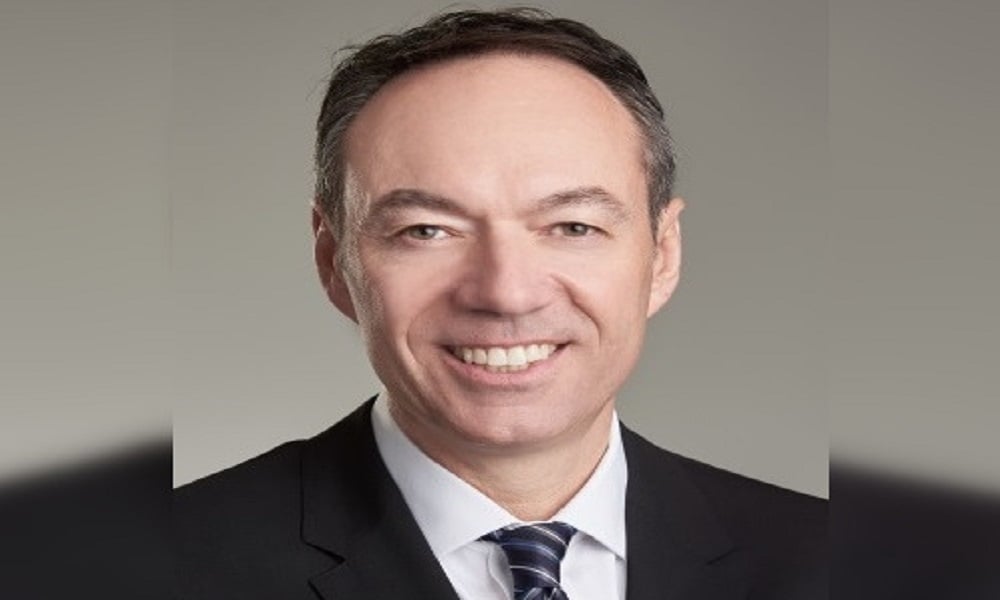Colin Ryan’s strategy revolves around financial planning and a long-term view that he invests in alongside his clients

Name: Colin Ryan
Title: Senior vice-president, managing director, portfolio manager
Practice: The Colin Ryan Group
Firm: BMO Nesbitt Burns
Location: Winnipeg, Manitoba
Years in the industry: 27
Certifications: CFA, ICD.D
In May, Colin Ryan, senior vice-president, managing director and portfolio manager with BMO Nesbitt Burns in Winnipeg, was named Portfolio/Discretionary Manager of the Year at the Wealth Professional Awards. A 27-year industry veteran, Ryan says he was fortunate to know what he wanted to do from a young age. After obtaining an honours degree in finance from the University of Manitoba, he joined Burns Fry and earned his CFA designation. He applied to be a portfolio manager in 1999 and has spent the past 20 years honing his strategy, which involves a long-term approach centered around financial planning – an approach he applies to his own portfolio.
“I personally own almost everything that my clients own, except for the fixed income because I have very long-term time horizon,” Ryan says. “I own most of the same equity and growth investments as our clients. That way I am totally aligned with the recommendations we make for them.”
Having some skin in the game is just one the hallmarks of a good portfolio manager, Ryan says. Another is basing clients’ portfolios on their goals and objectives, which are clearly laid out in a financial plan.
“My team and I spend a lot of time upfront with clients developing a plan that takes into account everything: retirement goals and objectives, business goals and objectives, business succession, risk and rate of return, and unique circumstances, and we put that into a document called an investment policy statement and a financial plan, which becomes the backbone of how we manage someone’s wealth.”
In doing so, Ryan frees up the time of his private and institutional clients so they can focus on more important things. “I think it’s important to start with someone’s financial plan,” he says. “Everyone is different – some people have a simple plan, and others are extremely complex. It’s important to have that framework done first because if you don’t, you don’t know how to invest that portfolio.”
Ryan says his team tends to keep portfolio construction simple because complexity doesn’t always equal results. Strategic asset allocation is designed for the long term and changed tactically when necessary.
“We keep things very simple and focus on a value-oriented, dividend and dividend-growth approach,” he says. “We think in the current environment, where you have low interest rates and cross currents with respect to trade and the economy, it is important to have companies with strong balance sheets that pay dividends and show the ability to continue to grow dividends.”
In terms of fixed income, Ryan believes it’s one of the biggest challenges portfolio managers have had to deal with over the last decade because of low interest rates and muted returns. “We have kept things relatively simple and short-term for private clients,” he says, “just because interest rates are so low, and private clients really like the safety and security of guaranteed fixed income.”
“I own most of the same equity and growth investment as our clients. That way I am totally aligned with the recommendations we make for them”
His long-term approach means Ryan can avoid overreacting to short-term noise. This is where his longevity in the industry pays off, as he’s seen different periods of market volatility play out, including the 1998 Asian crisis and the 9/11 attacks in 2001.
“I have been through a number of cycles and found that making decisions based on short-term volatility isn’t always the correct way to manage a portfolio,” he says. “We find that day-to-day movements in the marketplace are generally not based on fundamentals of the market. So we stick with good-quality companies – some have moats around them, barriers to entry, solid balance sheets – growing businesses that pay their dividends and raise them. A lot of the companies we own have track records of raising dividends for 20 years or more. Those types of companies can weather the storms that come along.”
Other qualities a good portfolio manager must have, Ryan says, include a great team and an emphasis on communication and education.
“I have a CFA, which is essentially the gold standard for portfolio management,” he says. “There is a lot of continuing education behind that, so I think you have to be someone who has a lifelong commitment to continuing education. My team has also been with me for the better part of 20 years, so we have a lot of consistency, which is good for clients.
“I think a good portfolio manager is someone who actually cares about their clients and treats them as individuals, not numbers,” he adds. “You have to care about the relationship and take time to listen to the clients because, at the end of the day, it is their money. Your role is to be a good active listener to understand what they want to see happen with their money. Then make sure to keep them updated regularly.”



